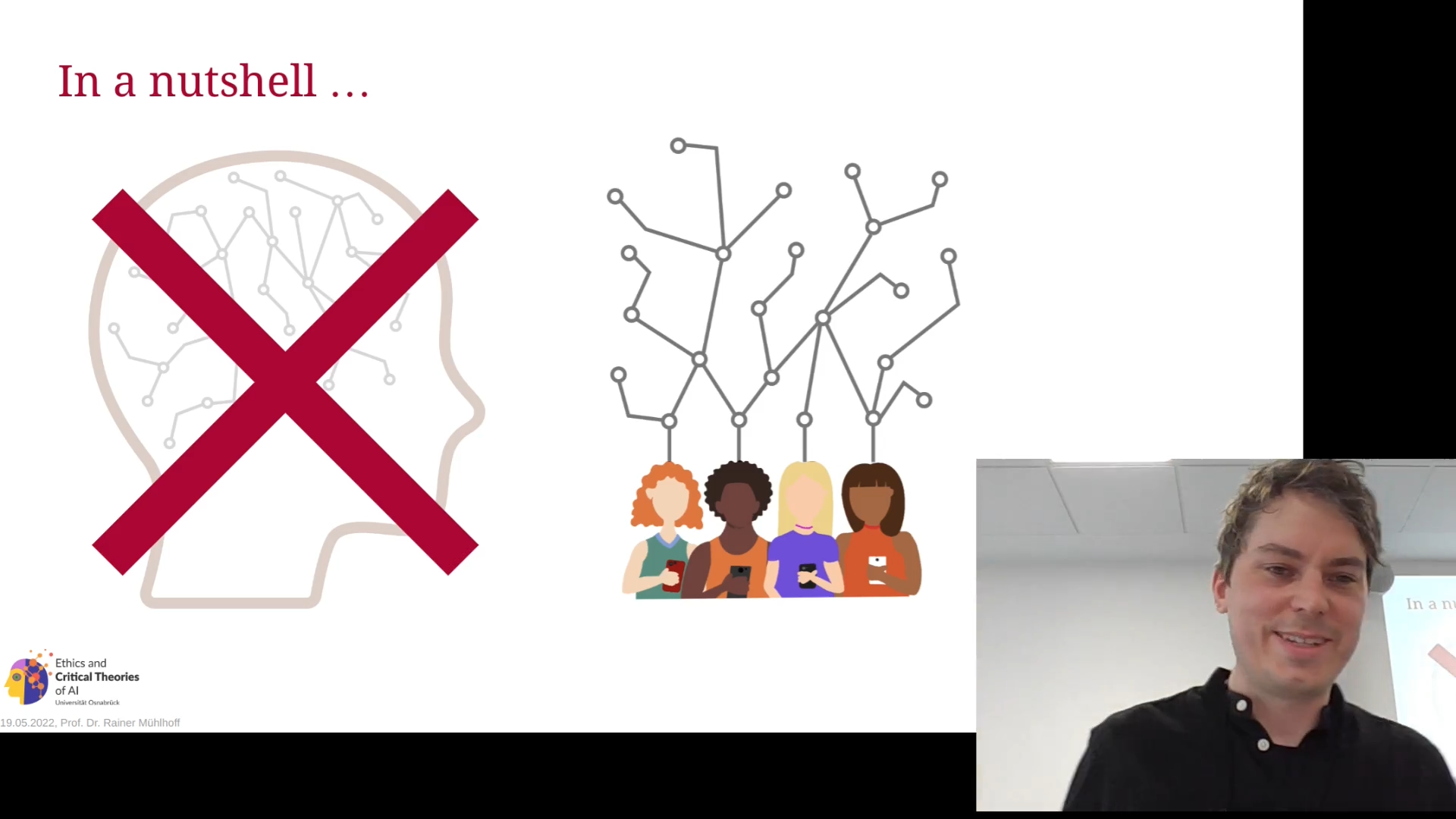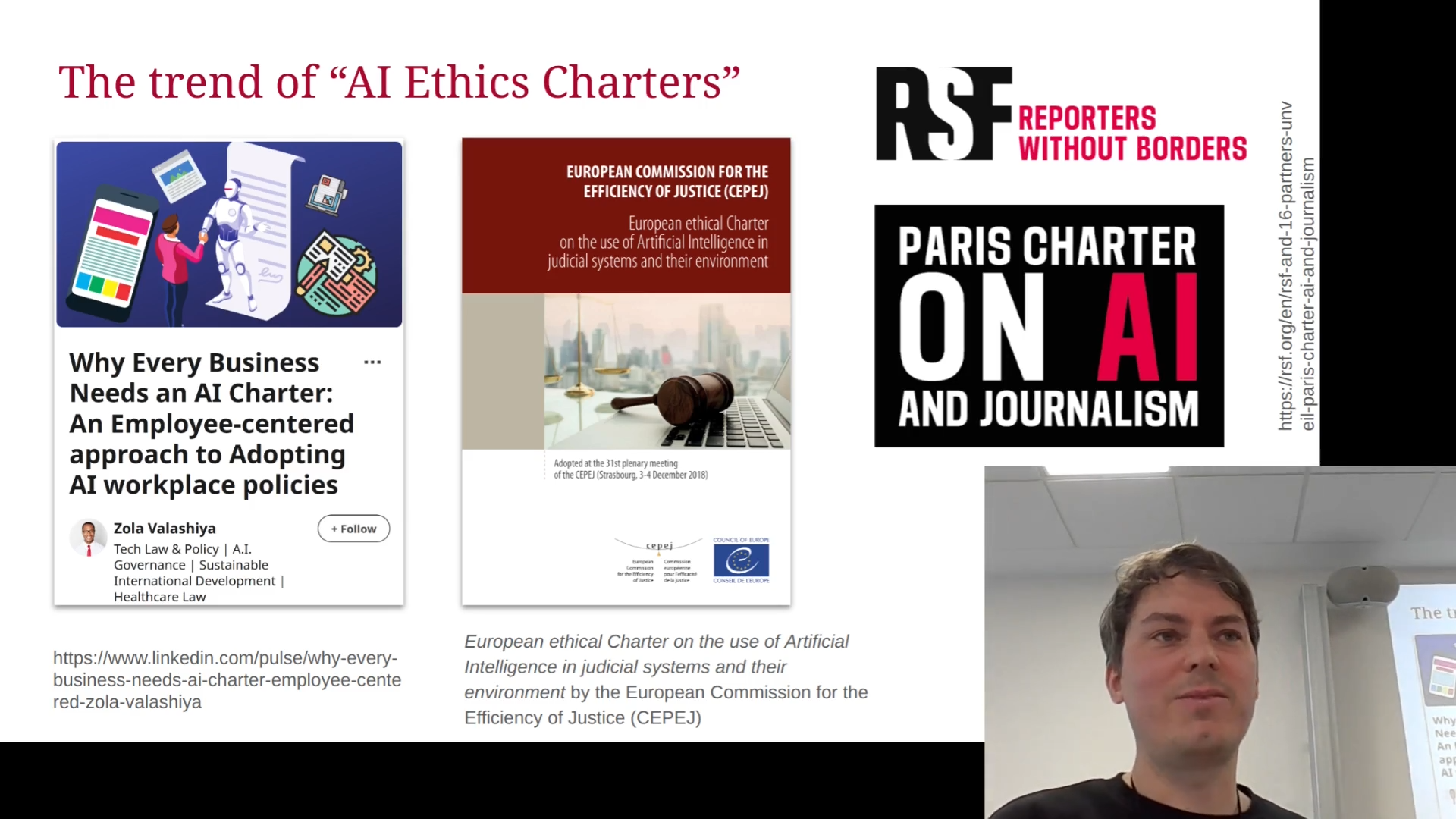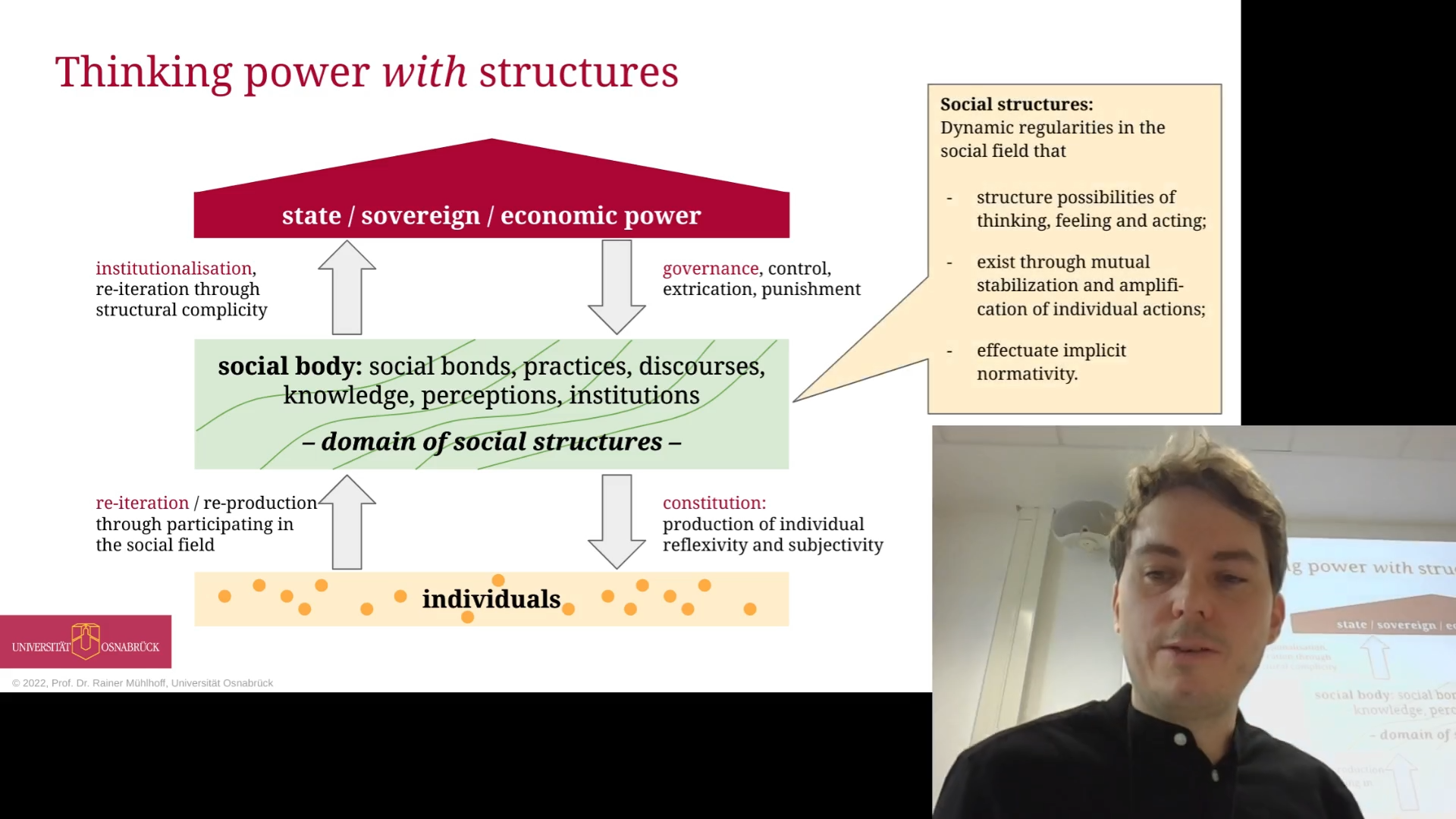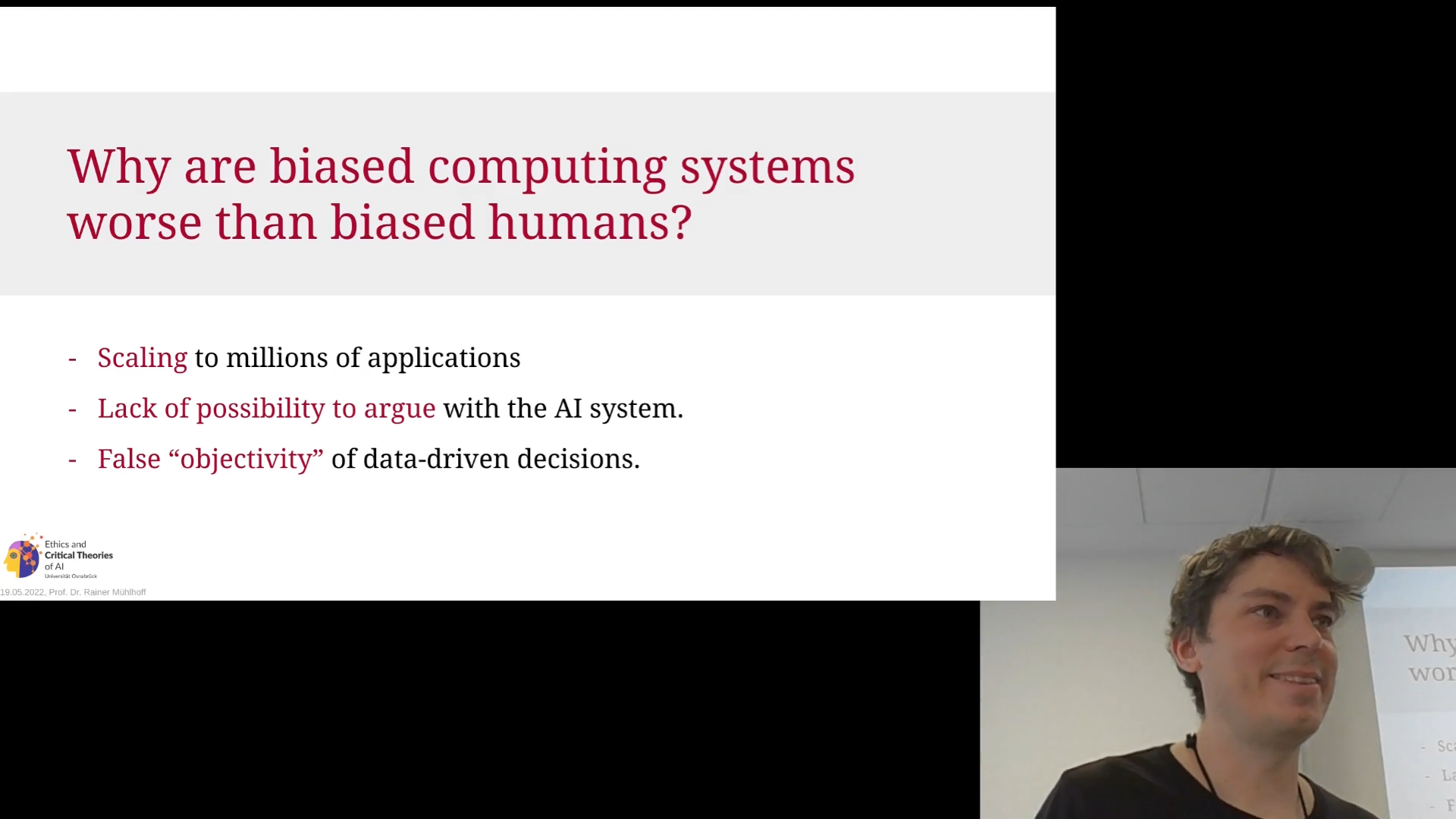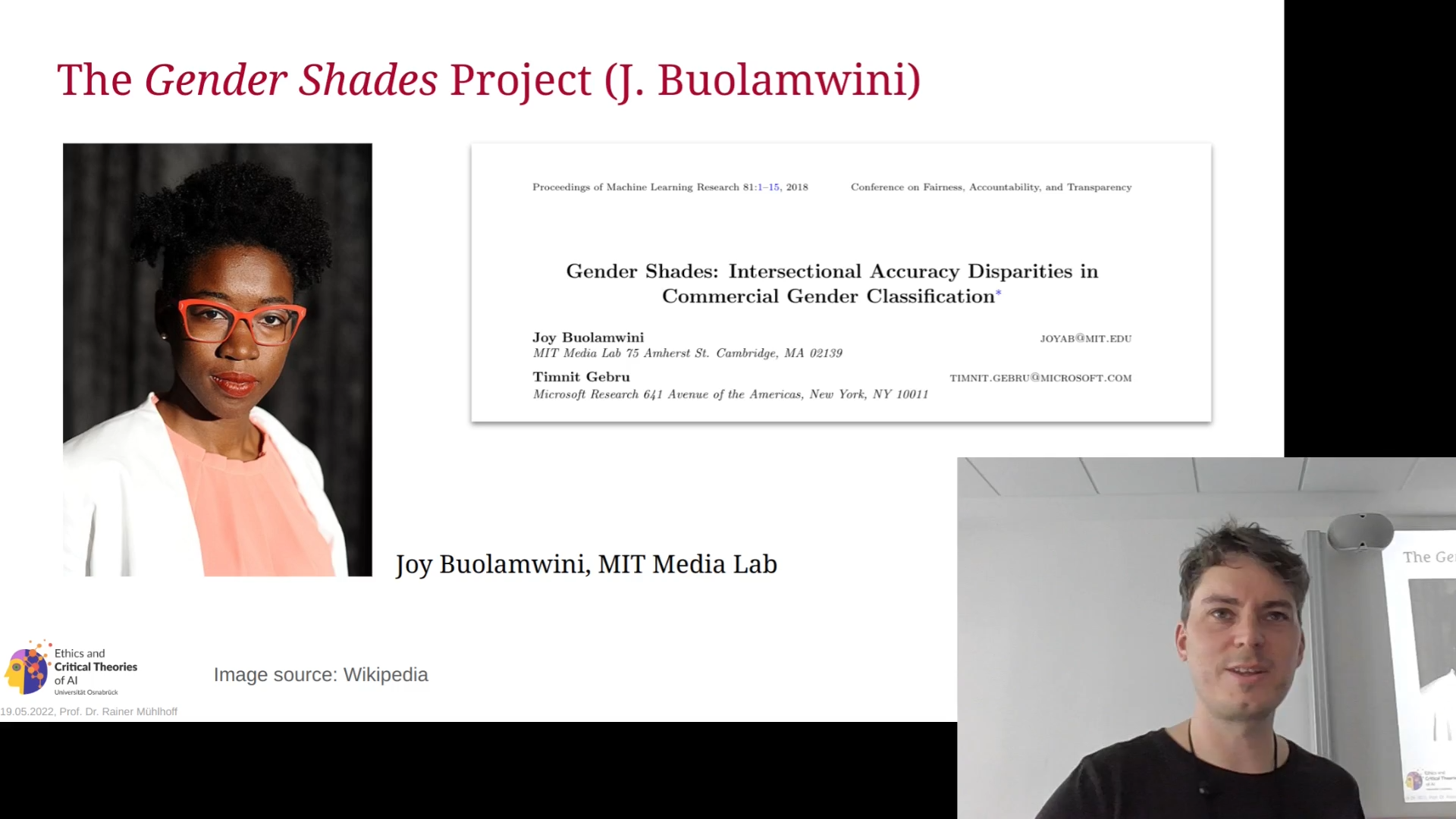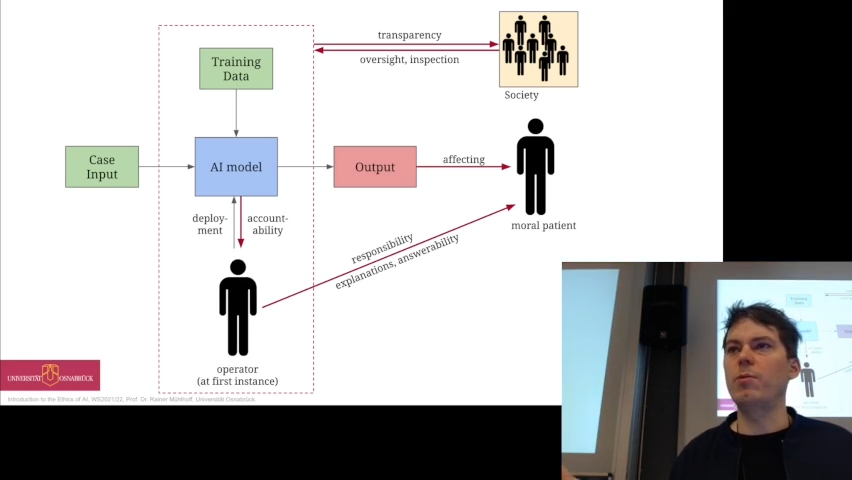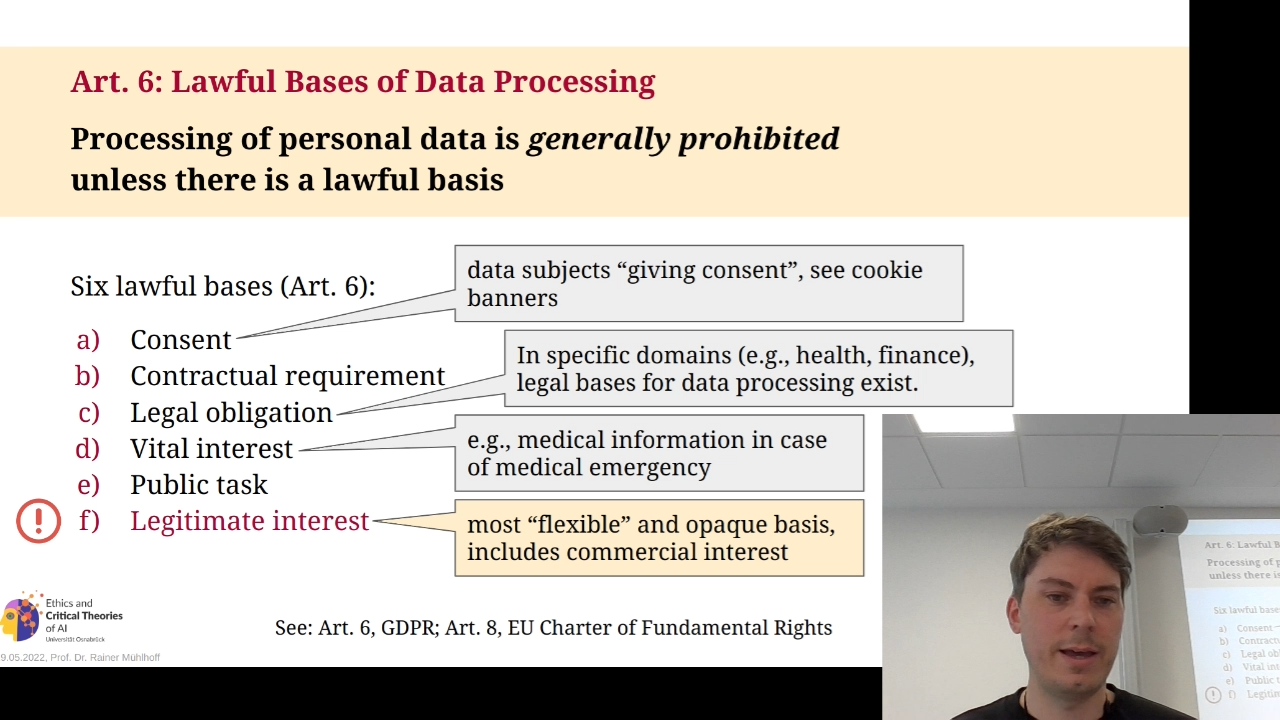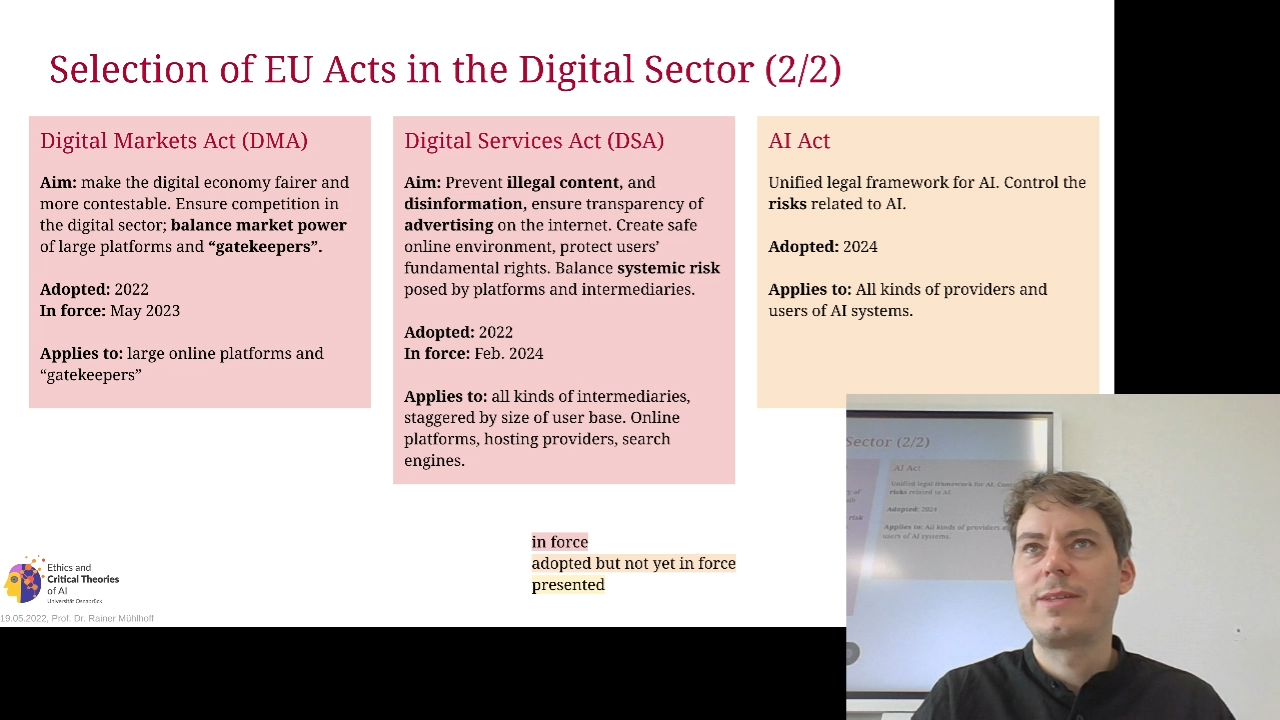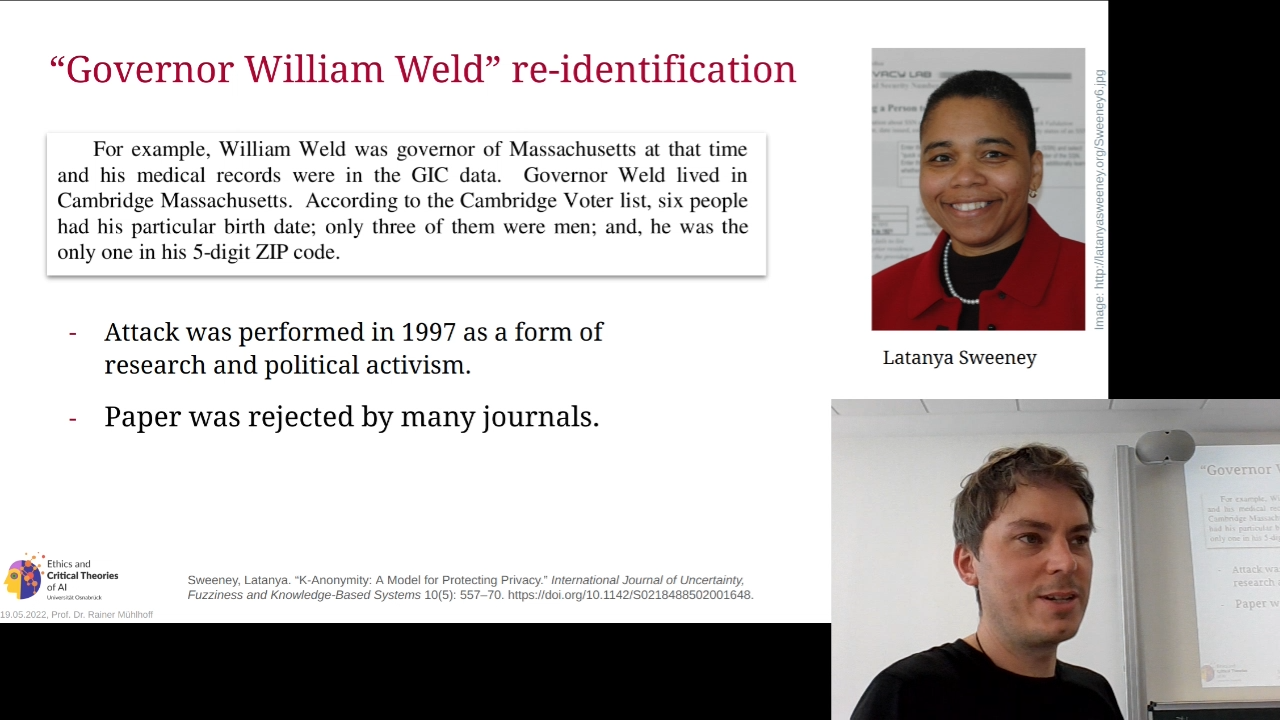Introduction to the Ethics of AI 2024
Lecture, University of Osnabrück, Summer Term 2024, Prof. Dr. Rainer Mühlhoff
Navigation: This is the archive of the 2024 version of this lecture.
To check if this is the most recent version, see the teaching program.
More past versions: [Winter Term 2022/23], [Winter Term 2021/22].
Recorded Sessions
To watch the videos, you will be asked for a login:
username = lecture, and the password is et.hi.cs.ofai without the dots.
To watch the videos, you will be asked for a login:
username = lecture, and the password is et.hi.cs.ofai without the dots.
Program
| Session | Date | Lecture Topic | Discussion Groups |
|---|---|---|---|
| 1 | 08.04. | Introduction / Human-Aided AI | Videos: 1) “Human Computation”, Google Tech Talk by Luis von Ahn, 2006. YouTube 2) “Artificial Intelligence is the New Electricity”, Stanford Talk by Andrew Ng, 2017. YouTube Coeckelbergh, Mark. 2020. AI Ethics. Cambridge, MA: The MIT Press. Chapters 1–2. |
| 2 | 15.04. | Ethics 101 | Dignum, Reponsible AI, Chapter 3. |
| 3 | 22.04. | Power I | Sattarov, Faridun. 2019. Power and Technology: A Philosophical and Ethical Analysis. Lanham: Rowman & Littlefield. optional: Netzpolitik, 2021-11-17. “Why chat control is so dangerous.” https://edri.org/our-work/why-chat-control-is-so-dangerous/ |
| 4 | 29.04. | Power II | Walls, Fiona. 2009. Mathematical Subjects: Children Talk about Their Mathematics Lives. Dordrecht/ ; New York: Springer, pp. 3–16. |
| 5 | 06.05. | Bias & Discrimination I | Friedman, Batya, and Helen Nissenbaum. 1996. “Bias in computer systems.” ACM Transactions on Information Systems 14(3). |
| 6 | 13.05. | Bias & Discrimination II | Videos: Joy Buolamwini and Kimberle Crenshaw |
| 7 | (20.05.) public holiday / video only | Responsibility & Explainability | Coeckelbergh, Mark. „Artificial intelligence, responsibility attribution, and a relational justification of explainability“. Science and Engineering Ethics 26(4), 2020: 2051–68. |
| 8 | 27.05. | AI Paternalism | Lacey, Cherie, and Catherine Caudwell. 2019. Cuteness as a Dark Pattern in Home Robots. In 2019 14th ACM/IEEE International Conference on Human-Robot Interaction (HRI), 374 81. IEEE. |
| 9 | 03.06. | Data Protection I | Steeves, Valerie. 2015. Privacy, Sociality and the Failure of Regulation: Lessons Learned from Young Canadians Online Experiences. In Social Dimensions of Privacy: Interdisciplinary Perspectives, edited by Beate Roessler and Dorota Mokrosinska, 244 77. New York: Cambridge University Press. |
| 10 | 10.06. | EU digital legislation | Ruschemeier, Hannah. 2023. “AI as a Challenge for Legal Regulation – the Scope of Application of the Artificial Intelligence Act Proposal.” ERA Forum 23 (3): 361–76. https://doi.org/10.1007/s12027-022-00725-6. |
| 11 | 17.06. | AI and Data Protection | Mühlhoff, Rainer. 2021. Predictive Privacy: Towards an Applied Ethics of Data Analytics. Ethics and Information Technology 23: 675 90. https://doi.org/10.1007/s10676-021-09606-x.tba |
| 12 | 24.06. | Differential Privacy + Q&A | No reading, discussion groups on exam Q&A. |
| 13 | 01.07. | Written exam / Klausur | no reading, no discussion groups. |
General course description and information
Access
The lecture can be accessed in three formats:
- On site: Mondays 16:15–17:45 CEST, starting 8 April 2024, room 15/128 (address: Seminarstraße 20, Osnabrück).
- Live stream in Zoom: Mondays 15:15–17:45 CEST [Zoom-Link]
- Asynchronous participation via video recordings, see below. I strive to make the recordings available by Tuesdays every week.
The lecture is public. Everybody can participate, although some additional functionality such as access to the weekly readings through Stud.IP and the weekly discussion groups are exclusive to registered students.
Course Description
This philosophical lecture provides an introduction to the emerging field of the Ethics and Critical Theories of AI. It is open to all interested students of all levels, including those from the humanities, as well as scientific and technical disciplines.
The lecture is an ideal starting point to get an orientation in the field and to possibly start engaging with more specialized courses and/or research projects in the context of the Ethics and Critical Theories of AI group at the Institute for Cognitive Science. The lecture will provide an overview of relevant problems, philosophical theories and critical methods. This includes both the philosophical foundations of ethics, critical theory and some aspects of social philosophy (such as power and social structures) as well as different technological phenomena and legal aspects of AI. A particular focus will be contemporary data-driven and machine learning-based AI technology and its applications in digital consumer media. As we will see, questions of social equality and fairness are central to today’s ethical concerns about AI, so that ethics needs to adopt a societal perspective, analyzing constellations of power, subjectivation, discrimination and subordination that relate to AI technology. Ethics will be framed in relation to intersectional critical philosophy, feminist and post-colonial theories. We will also touch upon relevant legal debates such as privacy and data protection legislation and AI regulation.
Discussion groups
The class is offered as a lecture with discussion groups (Vorlesung mit Übung). To earn ECTS points, students will have to participate in the 2 hr/week lecture and in a 2 hr/week discussion group. You will then get 6 ECTS points.
Please find the list of available discussion groups here.
Video/audio homework
Students who would like to obtain ECTS points for the discussion groups need to hand in a video or audio podcast once during the semester.
Please find details, advice & FAQ on video/audio homework here.
Grading and ECTS Points
Discussion groups
The class is offered as a lecture with discussion groups (Vorlesung mit Übung). To earn ECTS points, students will have to participate in the 2 hr/week lecture and in a 2 hr/week discussion group. You will then get 8 ECTS points.
Video/audio homework
Students who would like to obtain ECTS points for the lecture need to hand in a video or audio podcast to their discussion group once during the semester.
Exam (Klausur)
Students who would like to obtain ECTS points for the lecture (including Erasmus students) need to pass the final exam.
Date: Mon., 1 Jul. 2024, 16–18, room 15/128
Closed book exam on paper on site in the lecture hall; mostly multiple choice questions; no electronic devices allowed.

